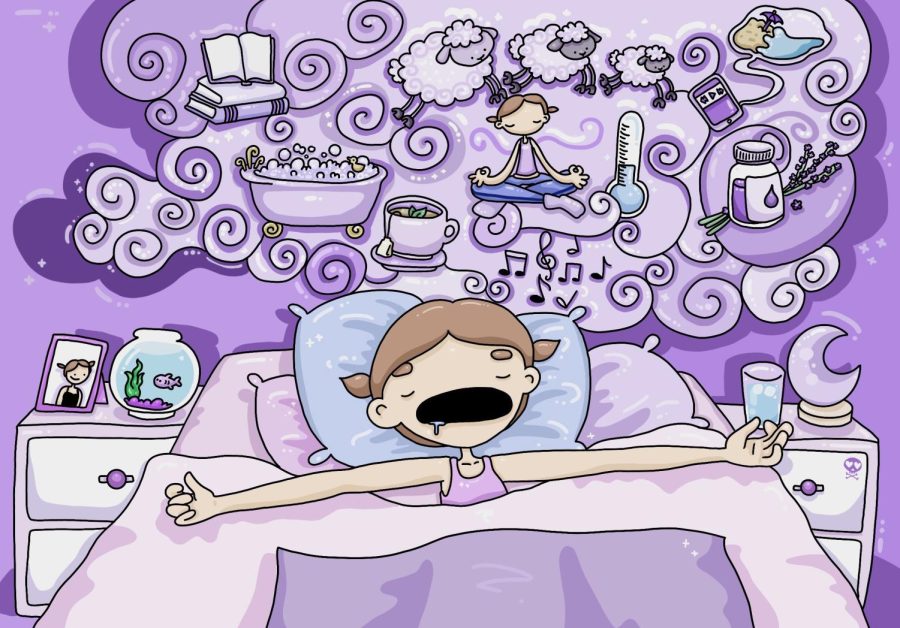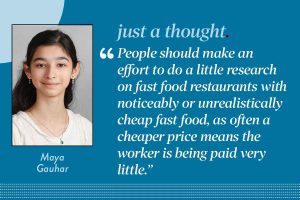Students find alternative ways to sleep as melatonin usage rises
Doctors say that natural sleep methods are healthier than melatonin, which, when taken regularly, could cause headaches and prolonged fatigue.
February 23, 2022
In the hour just before dawn, thoughts are still racing around in junior Anna Bohlen’s brain. With her eyes still wide open, she is on the verge of pulling an all-nighter because the supply of melatonin gummies she takes every night has run out.
Melatonin supplement usage has doubled in America over the past decade, according to a study recently published in the Journal of the American Medical Association, and while some U-High students take melatonin to help sleep, others use methods like journaling, reading and staying off electronics before bed to initiate a more natural sleep response and practice healthy sleep habits.
Melatonin is a hormone that is primarily produced during low levels of light, like nighttime, to regulate sleep cycles. While melatonin supplements have clinical short-term uses for jet lag or shift workers, Dr. Esra Tasali, associate professor of medicine and director of the Sleep Research Center at the University of Chicago, cautioned taking melatonin supplements regularly for sleep.
“When the secreted hormone levels are low, when you add the supplement, then it can be helpful,” Dr. Tasali said. “But when the levels are high in the evening hours, adding more melatonin, to help on a routine basis to help for your sleep initiation, is not the first recommended use of it.”
Dr. Tasali said some side effects of taking melatonin on a chronic basis could be drowsiness, fatigue or headaches.
While melatonin is available over the counter, the long-term effects of melatonin supplements are still unknown. Additionally, because melatonin pill production is not regulated by the Food and Drug Administration, the amount of melatonin content per pill can deviate as much as -83% to +478% from the advertised amount, according to one study.
Instead of taking melatonin pills, Dr. Tasali strongly recommends natural sleep methods, like staying away from electronic devices an hour before sleep because the blue light emitted from screens may suppress melatonin production and make it difficult to initiate sleep.
Even though Anna takes melatonin supplements, she also tries to implement natural sleep methods like shutting off screens and reading an hour before bed.
Anokha Nathan, a junior, took melatonin occasionally last year, but now journals before going to sleep. She has a bullet journal to doodle and write her to-do list, and a regular journal to express herself and jot down her feelings on paper, which makes her feel relaxed before going to sleep.
“It’s just something that helps me kind of de-stress and get my brain out of this, you know, mindset where I’m like, ‘I gotta solve this problem, or I gotta turn this in on time,’” Anokha said.
Anokha likes journaling more than taking melatonin because it serves as a natural cue for her to recognize when to sleep.
“It’s more low key, you know. It’s not kind of like, ‘OK, I have to take this,’” Anokha said. “I feel like it’s kind of a nice transition from doing my homework to going to bed, and with taking melatonin I didn’t get that transition.”
Junior Joe Bremer tries to stay off screens half an hour before sleep and stop homework at 10 p.m. in order to rest. He said he developed poor habits over the pandemic.
“My sleep habits just sort of deteriorated to the point where I was going to bed at like, 2 or 3 a.m. every night,” Joe said.
Before falling asleep every night, Joe also uses the app Murmur to record an audio journal as a meditative practice to get down any anxieties and thoughts still racing around his head.
While high school has a lot of homework, Dr. Tasali reiterated the importance of sleep for cognitive function and academic achievement.
“The same homework that you would be able to do in 20 minutes, you’re spending an hour on it, because you’re sleep deprived,” Dr. Tasali said. “But if you were to get more sleep, it’s not a waste of time. It is actually making you more efficient to accomplish the same task in a shorter amount of time.”
Joe’s suggestion to students: “Don’t just have a wake up alarm, also have a go-to-sleep alarm.”





























































